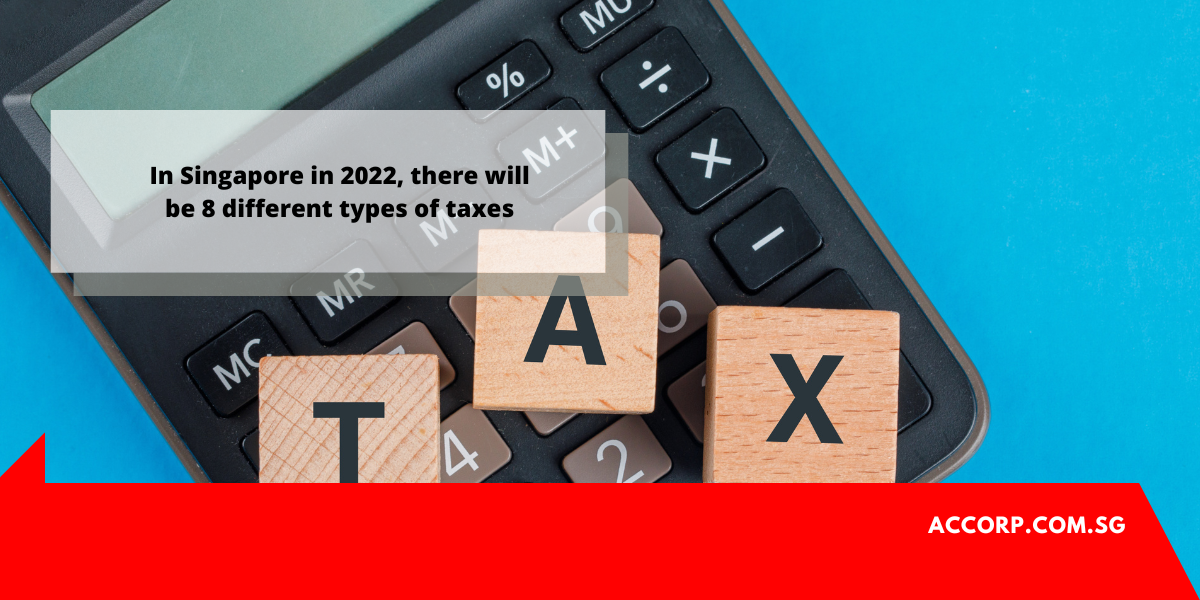Singapore is a country that does not require an introduction. It is not only a popular tourist and expat destination, but it is also a popular business location. If you wish to do business in Singapore, you need to understand more about Singapore taxes.
What Are Singapore’s Different Taxes?
Singapore is a tiny island nation with world-class infrastructure and prominent luxury and entertainment icons. Singapore, being a melting pot of many cultures, is no surprise to many outsiders. Aside from enjoyment and luxury, Singapore is noted for its strong business and financial presence.
It is still one of the world’s most business- and tax-friendly countries. Its taxation structure is often regarded as one of the most competitive in the world. It’s no surprise that enterprises are eager to relocate their operations to Singapore.
Corporate Taxation
Singapore’s corporate income tax is territorial, which means that only income received or sourced in Singapore is taxed. Companies must file an income tax return for earnings received in or generated from Singapore. In contrast to other nations, such as the United States, money earned in other countries is not taxed. Companies are taxed at a fixed rate of 17% on their taxable income. You may get assistance from any expert accounting company in comprehending Singapore’s corporate income tax. Here are some pointers to help international company owners pick the best accounting firm in Singapore.
Singapore also makes it appealing by introducing incentive plans that cut corporate tax rates to considerably below 17%. If you are a new business, you can take advantage of corporation tax breaks for the first three years, paying 75% of the first $100,000 of chargeable income and just 50% of the tax on the following $200,000 of chargeable revenue.
Singapore also offers industry and sector-specific tax systems that cut tax rates and grant particular tax exemptions. These businesses include banking, shipping, leasing, and investment management. These techniques frequently cut the company’s effective tax rate to less than 17%.
Tax on Goods and Services (GST)
GST, or Products and Services Tax, is a 7% tax on goods and services manufactured or imported into Singapore. The GST does not apply to financial services or revenue from the sale or lease of residential property. GST registration is open to sole proprietorships, partnerships, government agencies, clubs, and non-profit organisations.
Singapore GST is also quite comparable to other nations’ VAT or Value Added Tax. The Singapore government has not modified the Goods and Services Tax rate, according to the 2014 Budget, because of how well it has worked and how well it has kept businesses and their consumers pleased. GST registration is divided into two categories: mandatory and optional. If your company satisfies specific criteria, it may be excused from registering for GST. If a permanent establishment is not required to register for GST, it may be advantageous to do so voluntarily.
One of the main reasons why entrepreneurs are lured to Singapore, according to the World Economic Forum, is its personal income tax rate. Because of the GST, this can be reduced even further. The government gathers statistics on tax revenue growth so that it can completely understand the income from business tax payments, allowing them to cut personal tax rates.
When consumers pay GST on everything they buy, lower individual tax rates become more sustainable in the long term. In other words, GST may assist firms in saving money.
Individuals and company owners seeking further tax breaks from the Singaporean government must apply for a Certificate of Residency in Singapore.
Income Tax for Limited Liability Partnerships (LLP)
A Singapore LLP, by definition, is a corporate form that needs two or more partners. Partners must be at least 18 years old and resident in Singapore, or they must be a body corporate of another business or LLP.
LLPs are not taxed at the entity level, even though they are treated as a partnership. Instead, the earnings of an LLP are considered a partner’s personal income. Because the personal income tax rate is used, the partners are taxed rather than the partnership.
Income Tax for Partnerships and Sole Proprietors
If you conduct your business as a sole proprietorship or as a partnership, your business revenue is included in your personal income. As a result, personal income tax rates will apply. When a consumer pays you for a Singapore product or when you receive money in Singapore from international sales, income tax rates apply. This income tax applies to every individual or corporation who earns money in Singapore. This includes your wages, companies, interest on various deposits, and other sources of taxable income.
Sole proprietors and partners will be able to take advantage of personal tax rates and tax exemptions to lower taxes, allowing them to continue operating their enterprises in Singapore. They can also benefit from tax breaks, rebates, and relief to help them manage their finances.
Sole proprietors and company partners can deduct Allowable Business Costs for expenses spent by their enterprises to produce revenue. These expenditures include, but are not limited to, rental revenue, office supplies and stationery, and staff pay.
They can also claim Capital Allowances, which are expenditures incurred by their enterprises while acquiring machinery and other equipment. They can also claim Unused Losses and Capital Allowances, which they can carry over to the next fiscal year. Donations to charity organisations can also result in tax breaks and rebates for sole proprietors and company partners.
The Withholding Tax
If your company employs Singapore non-residents as employees and foreign agents, or if your business partners are Singapore non-residents, they must pay withholding tax.
This is paid to the Singapore Inland Revenue Authority (IRAS). This withholding tax will apply to foreign, off-shore, and non-resident partners and employees’ commissions and fees. The rate of withholding tax varies based on the kind of payment.
Taxation on Real Estate
All properties in Singapore are subject to property tax. HDB apartments, warehouses, factories, offices, and even vacant lots are all included. This is given out yearly on or before January 31st at a tax rate of 10%. This fee can be decreased if you fulfil the owner-occupier requirements.
Property owners, like individuals, can benefit from various rebates and tax refunds to make taxes affordable. For example, if your property has been empty for at least a month owing to maintenance work or a lack of renters, you may be able to decrease your property tax.
Stamp Duties
When it comes to purchasing property in Singapore, there are additional charges. Stamp Duty is one of them.
Stamp Duty is simply the tax on papers related to the leasing or purchase of real estate. This will be paid to the IRAS.
Stamp duty applies to all residential property transactions, whether buying, selling, or renting, with a few exceptions.
Stamp Duty can be rather expensive, so keep this in mind while planning your budget. You may use this calculator to determine how much you must pay.
Buyer’s Stamp Duty (BSD)
Purchasing property in Singapore will need the payment of BSD, or Buyer’s Stamp Duty, for the paperwork completed for these transactions. BSD is calculated based on the purchase price specified in the document to be stamped or the market value of the property, whichever is greater.
On the 20th of February 2018, the BSD was recently changed, and the current rates are as follows:
- For the first $180,000 of purchase price or market value, the BSD rate is 1% on residential assets and 1% for non-residential buildings.
- For the first $180,000 of purchase price or market value, the BSD rate is 2% for residential assets and 2% for non-residential buildings.
- For the following $640,000 in purchase price or market value, the BSD rate is 3% on residential assets and 3% for non-residential buildings.
- For the balance of the purchase price or market value, the BSD rate is 4% for residential assets and 3% for non-residential properties.
Closing
Singapore’s tax system is an excellent illustration of how tax incentives may be efficiently used to encourage free trade and commercial activity while ensuring that the state collects enough income to achieve both economic and social objectives. This enabled the country to foster an atmosphere in which the state and its inhabitants benefit from one another.
Because of their streamlined tax rules, they have one of the greatest rates of tax compliance among domiciled residents and enterprises in the world. This symbiotic relationship has allowed the country to construct world-class infrastructure, improving the quality of life for its citizens and tempting global firms to migrate to Singapore.
For more information about tax service Singapore, please visit https://www.accorp.com.sg/









